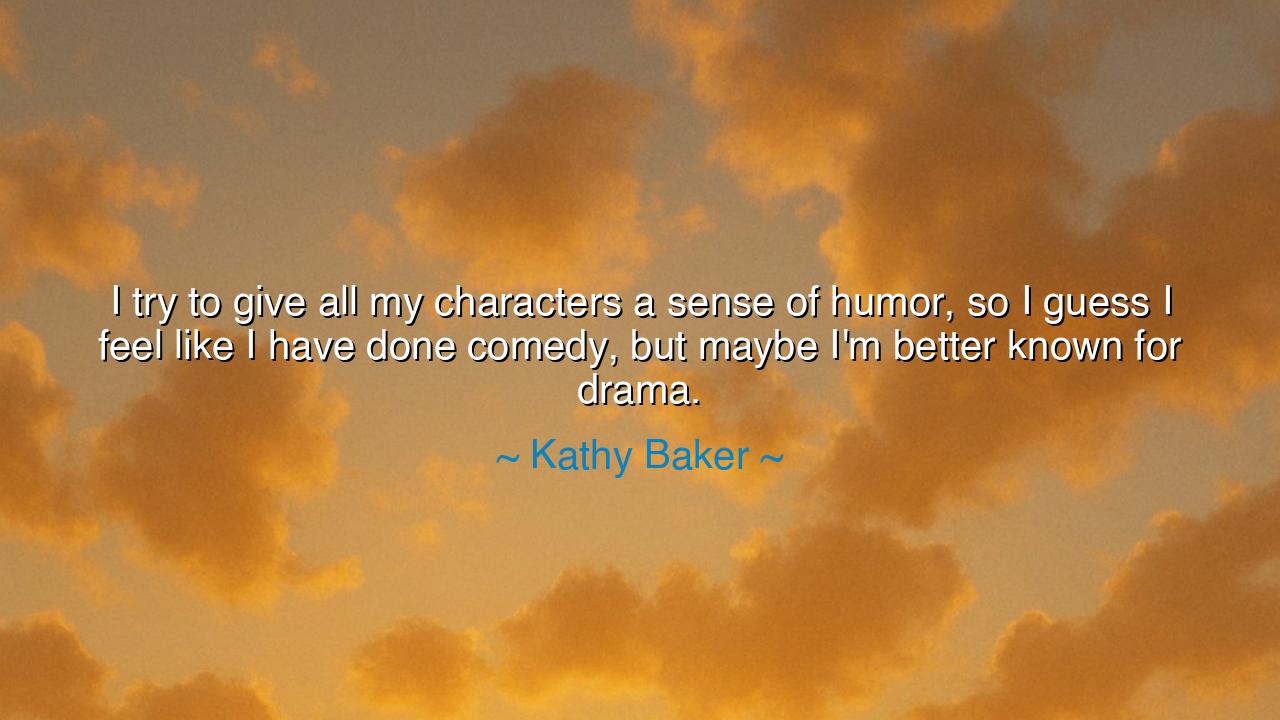
I try to give all my characters a sense of humor, so I guess I
I try to give all my characters a sense of humor, so I guess I feel like I have done comedy, but maybe I'm better known for drama.






In the grand tapestry of life, where laughter and tears both shape the human soul, there is a remarkable truth that emerges from the words of Kathy Baker: "I try to give all my characters a sense of humor, so I guess I feel like I have done comedy, but maybe I'm better known for drama." In these words, there is a profound understanding of the dual nature of human existence—the intertwining of light and dark, of joy and sorrow, and the realization that even in the most serious of moments, humor has the power to illuminate the human condition. Baker reveals that while we may be defined by the roles we play, we are never simply one thing, for the fullness of our humanity is expressed through both the laughter and the tears we share.
The ancients too understood the power of humor in even the most somber of contexts. In the great Greek tragedies, we find moments of profound sorrow, yet there are also moments of irony and wit. Sophocles, Euripides, and Aeschylus wove humor into their works not as a distraction, but as a way to expose the contradictions of life and to offer the audience a brief respite from the heavy themes of fate, suffering, and mortality. Comedy and tragedy were never seen as opposing forces but as complementary expressions of the full range of the human experience. In the same way, Baker’s characters, though often placed in dramatic settings, carry within them the lightness of humor, making their suffering more relatable, and their victories more human.
Consider the example of William Shakespeare, whose genius lay not only in his ability to write profound tragedies like Macbeth and King Lear, but also in his use of humor in his plays. Even in the darkest moments of Hamlet, Shakespeare offers a touch of wit, often through the character of the fool or the use of puns. These humorous moments are not mere diversions but serve to deepen our understanding of the tragic hero's plight. Baker’s assertion that she strives to give all her characters a sense of humor mirrors this ancient tradition of blending the comic and the tragic, recognizing that humor allows us to face the darkest aspects of life with a sense of humanity and connection.
Baker’s approach reminds us of the ancient wisdom that humor is a tool for resilience. In the face of the most overwhelming challenges, it is humor that can provide a shield against despair. Victor Frankl, the Austrian neurologist and Holocaust survivor, wrote of the importance of humor in his book Man’s Search for Meaning, where he describes how prisoners in concentration camps would find moments of levity to survive. He argues that humor gave them the power to maintain their dignity and humanity, even in the most dehumanizing of circumstances. Baker, like Frankl, understands that humor, even in the midst of drama, is a tool that allows us to see the full spectrum of the human experience—our flaws, our virtues, and our shared struggles.
The lesson we learn from Baker’s words is that true depth comes from the balance between laughter and sorrow. Humor is not an escape from life’s difficulties, but a way to endure them. Just as the ancients saw comedy and tragedy as two sides of the same coin, we too must embrace both aspects of life. In our own lives, we often face challenges and hardships, yet it is through humor that we find the strength to carry on. Baker’s commitment to imbuing her characters with humor—even in the midst of their most dramatic trials—teaches us that it is not the absence of suffering that defines us, but our ability to face it with dignity, grace, and sometimes, a smile.
In the grand tradition of the ancients, we are reminded that the human spirit is not defined by any single emotion or experience but by its capacity to hold both the joys and the sorrows of life in tandem. Let us take this wisdom into our own lives, recognizing that no matter how heavy the burden we carry, there is always a moment of humor to be found, a way to lighten our hearts and find connection with others. Baker’s approach to character creation is a call to action for each of us: as we navigate our personal journeys, let us not forget the power of humor to enrich the stories we live and share, even when the narrative seems overwhelmingly serious.
Thus, as we move forward in our own lives, let us strive to cultivate both the drama and the humor that make us fully human. Let us remember that the capacity to laugh in the face of adversity is not a weakness, but a strength—a sign of resilience and wisdom. Like Baker’s characters, who are never defined by a single emotion, let us embrace the full range of our experiences, understanding that it is through this balance that we grow, learn, and ultimately connect with one another. In the fusion of humor and drama, we discover the depth of our own humanity and the potential for joy even in the darkest of times.






AAdministratorAdministrator
Welcome, honored guests. Please leave a comment, we will respond soon